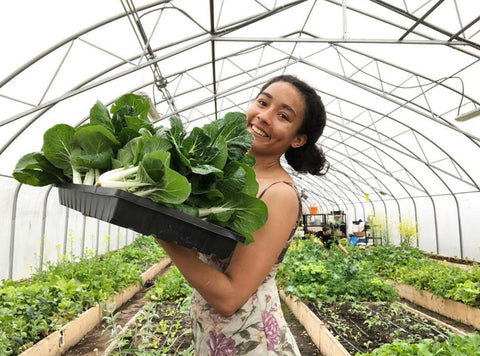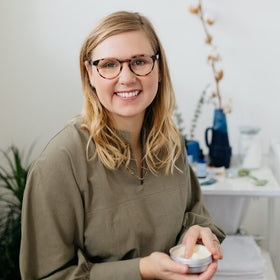Women We Admire | Cheyenne Sundance of Sundance Harvest Farm

Cheyenne Sundance is a farmer and the founder Sundance Harvest Farm, a food justice-centred year-round urban farm located in Toronto, Ontario. She is a self-taught farmer and food and community justice advocate. With her business firmly rooted in anti-oppression food sovereignty + climate justice, Cheyenne likes growing food because of the independence it brings to her and her community. She has extensive skills in workshop facilitation and offers mentorship for low-income youth on the margins (Black, Indigenous, POC, LGBTQ, and persons with disabilities), as well as programs that support urban agriculture.
Cheyenne recently launched a Community Farm Fundraiser to take her business to the next level. You can donate + support Cheyenne’s work here + by following her on Instagram at @sundanceharvest.
We asked her a few questions about her mission, food justice, personal practices, and her experience running her farm.
Cheyenne recently launched a Community Farm Fundraiser to take her business to the next level. You can donate + support Cheyenne’s work here + by following her on Instagram at @sundanceharvest.
We asked her a few questions about her mission, food justice, personal practices, and her experience running her farm.
What inspired you to start Sundance Harvest?
I did not see an urban farm reflecting what I know is needed to create a resilient and fair food system - one that prioritized the voices and leadership of Black, Indigenous and POCs, acknowledged and took action against systemic racism in the food system, and provided free and accessible growing education to youth on the margins. This is why I started Sundance Harvest.
What does food justice look like to you + why is it important?
To me, food justice looks like - those who are most affected by food and land-based oppression are in positions of power and leadership in the food system. White executive directors at non-profits and white led corporate urban farms will not save us nor lead Black and Indigenous people to liberation. To quote Audre Lorde,” One cannot dismantle the Master’s house with the Master’s tools”. To dismantle systematic racism and oppression in the food system, those who are most affected - Black and Indigenous people (according to this study by the University of Toronto) must be the ones to lead the change. But we must have the tools - implementing land back and Indigenous food sovereignty, funding for Black-led community farms, having Black and Indigenous people as executive directors at food-related non-profits, creating community-led local grocery stores and access to farming land and resources to grow urban spaces that we can run ourselves. This is what food justice looks like to me.
I did not see an urban farm reflecting what I know is needed to create a resilient and fair food system - one that prioritized the voices and leadership of Black, Indigenous and POCs, acknowledged and took action against systemic racism in the food system, and provided free and accessible growing education to youth on the margins. This is why I started Sundance Harvest.
What does food justice look like to you + why is it important?
To me, food justice looks like - those who are most affected by food and land-based oppression are in positions of power and leadership in the food system. White executive directors at non-profits and white led corporate urban farms will not save us nor lead Black and Indigenous people to liberation. To quote Audre Lorde,” One cannot dismantle the Master’s house with the Master’s tools”. To dismantle systematic racism and oppression in the food system, those who are most affected - Black and Indigenous people (according to this study by the University of Toronto) must be the ones to lead the change. But we must have the tools - implementing land back and Indigenous food sovereignty, funding for Black-led community farms, having Black and Indigenous people as executive directors at food-related non-profits, creating community-led local grocery stores and access to farming land and resources to grow urban spaces that we can run ourselves. This is what food justice looks like to me.
What’s the most useful business lesson you’ve learned?
Carve your own path, but not too off the main. I’ve found that for me as a farmer if I stuck to the normal streams of income which is a summer CSA and Farmers Markets, I wouldn’t be making a living wage and would struggle. If you have an idea but everyone else is doing it, know that you will have to fight much harder to get seen, heard, and appreciated. However, if you twist the idea a bit and make it into a niche it could really work! I don’t offer a summer CSA (community-supported agriculture), but only a CSA in the offseason, for example!
What do you love most about your work?
I love knowing that it will have a lasting impact on the food system and also within the climate crisis.
What's the best advice you've received?
Don’t wait. I’m 23 years old and when I started Sundance Harvest full-time at 22. SO many people told me to: “Just wait!”, “Maybe you should work on someone else’s farm?, “Why don’t you team up with other folks and try XYZ”. If you have an idea, an execution plan, and the real drive to make a change and see it? Just do it. When you’re young, it’s really hard to regret trying out a dream because if it doesn’t work you have loads of time. I would just do it!
Who are some of the women you admire?
Leah from Soul Fire Farm, Angela Davis, and Fannie Lou Hamer.
Do you have a favourite book?
I Know Why The Caged Bird Sings by Maya Angelou.
Where do you get your power from?
My deep Aries stubbornness and dislike for oppression within the food system.
What does wellness look like for you? Do you have a favourite self-care practice?
Once a week I like ordering my favourite fancy pizza and watching a really good show. Or socializing! Pre-pandemic, every weekend my dreams and I would put glitter on faces and go out dancing.
When do you feel most like yourself? When are you at your happiest?
When I’m swimming in a river, far far away. Or when I’m disco dancing. Or both (not at the same time!)
What can you do today that you couldn't one year ago?
Do a really great keynote speech!
How would you spend a perfect 'day off'?
Going country strawberry picking with my partner and then taking the motorcycle down to a river and jumping in for a swim, followed by meeting up with friends for an evening of storytelling and laughter.
What’s the best part about being an entrepreneur? What’s the worst part?
I can make my own schedule and go to work as late as I want. I’m way more responsible for all the small bits and pieces like accounting. Which sucks cause I hate math!
Carve your own path, but not too off the main. I’ve found that for me as a farmer if I stuck to the normal streams of income which is a summer CSA and Farmers Markets, I wouldn’t be making a living wage and would struggle. If you have an idea but everyone else is doing it, know that you will have to fight much harder to get seen, heard, and appreciated. However, if you twist the idea a bit and make it into a niche it could really work! I don’t offer a summer CSA (community-supported agriculture), but only a CSA in the offseason, for example!
What do you love most about your work?
I love knowing that it will have a lasting impact on the food system and also within the climate crisis.
What's the best advice you've received?
Don’t wait. I’m 23 years old and when I started Sundance Harvest full-time at 22. SO many people told me to: “Just wait!”, “Maybe you should work on someone else’s farm?, “Why don’t you team up with other folks and try XYZ”. If you have an idea, an execution plan, and the real drive to make a change and see it? Just do it. When you’re young, it’s really hard to regret trying out a dream because if it doesn’t work you have loads of time. I would just do it!
Who are some of the women you admire?
Leah from Soul Fire Farm, Angela Davis, and Fannie Lou Hamer.
Do you have a favourite book?
I Know Why The Caged Bird Sings by Maya Angelou.
Where do you get your power from?
My deep Aries stubbornness and dislike for oppression within the food system.
What does wellness look like for you? Do you have a favourite self-care practice?
Once a week I like ordering my favourite fancy pizza and watching a really good show. Or socializing! Pre-pandemic, every weekend my dreams and I would put glitter on faces and go out dancing.
When do you feel most like yourself? When are you at your happiest?
When I’m swimming in a river, far far away. Or when I’m disco dancing. Or both (not at the same time!)
What can you do today that you couldn't one year ago?
Do a really great keynote speech!
How would you spend a perfect 'day off'?
Going country strawberry picking with my partner and then taking the motorcycle down to a river and jumping in for a swim, followed by meeting up with friends for an evening of storytelling and laughter.
What’s the best part about being an entrepreneur? What’s the worst part?
I can make my own schedule and go to work as late as I want. I’m way more responsible for all the small bits and pieces like accounting. Which sucks cause I hate math!



